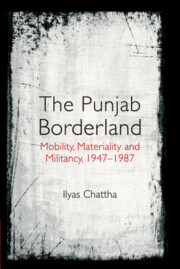Book contents
- Frontmatter
- Dedication
- Contents
- List of Figures
- List of Tables
- Preface and Acknowledgements
- Note on Transliteration
- List of Abbreviations
- Introduction
- 1 Making of the Border
- 2 Cross-Border Flows
- 3 Illicit Cities: Contraband Trade between Lahore and Amritsar
- 4 Illicit Global Gold Trade and Wagah–Attari Crossing
- 5 The Making of Contraband Culture: People and Poetics
- 6 The Regulation of Cross-Border Flows and State Patronage
- 7 Guns, Drugs and the End of the ‘Good Old Days’
- Conclusion: Between Open and Closed Borders
- Glossary
- Appendix
- Bibliography
- Index
4 - Illicit Global Gold Trade and Wagah–Attari Crossing
Published online by Cambridge University Press: 30 November 2021
- Frontmatter
- Dedication
- Contents
- List of Figures
- List of Tables
- Preface and Acknowledgements
- Note on Transliteration
- List of Abbreviations
- Introduction
- 1 Making of the Border
- 2 Cross-Border Flows
- 3 Illicit Cities: Contraband Trade between Lahore and Amritsar
- 4 Illicit Global Gold Trade and Wagah–Attari Crossing
- 5 The Making of Contraband Culture: People and Poetics
- 6 The Regulation of Cross-Border Flows and State Patronage
- 7 Guns, Drugs and the End of the ‘Good Old Days’
- Conclusion: Between Open and Closed Borders
- Glossary
- Appendix
- Bibliography
- Index
Summary
A close reading of the recorded patterns of goods seized at the Wagah–Attari crossing reveals the overriding significance of gold smuggling. Throughout the 1950s and the 1960s, more people were involved in gold smuggling than any other form of cross-border contraband, who were driven by prices and profits. What is inescapable throughout, however, is the continuing demand for gold that fuelled the black market in bullion. What seems to have happened is that coordinated entrepreneurs secured batches of gold wherever possible and smuggled them into the subcontinent to take advantage of the prices inflated by Partition, the state prohibition and sheer demand of gold for the societal preference for a variety of reasons. Gold flows brought some wealth to the Punjab borderland, which served as the global countryside and transit points for a vibrant flow of contraband trade with India. This chapter explores some of the contours of illicit gold trade, asking firstly what its polymorphous character could tell us about the nature of boundary and dynamics of smuggling along the Punjab border. Which social groups monopolised gold smuggling and how were they connected across the border? How serious a threat was gold smuggling to the functioning of local and national economies? What could the extent of gold smuggling tell us about the early postcolonial India–Pakistan states?
Answers to these questions have a relevance which reach well beyond Punjab to many other places in the contemporary world from Dubai to London where much gold was contrabanded. The chapter also considers how contraband gold played a part in the expansion of regions’ bullion markets in the immediate years after Partition. Comparative studies in other parts of the world have highlighted the influence of contraband gold in the development of some Asian cities’ bullion markets as well as capital accumulation. There is, however, no comparable in Pakistan studies. This exploration seeks to account for the growth of Lahore's bullion market and the consolidation of its sarafa community through the global contraband flows of gold in the early years after Partition.
Gold is a commodity of many contexts in India and Pakistan where South Asian communities traditionally valued gold both for hoarding bars and as ornaments. During British rule, restrictions on gold imports were imposed during the Second World War.
- Type
- Chapter
- Information
- The Punjab BorderlandMobility, Materiality and Militancy, 1947–1987, pp. 132 - 163Publisher: Cambridge University PressPrint publication year: 2022



